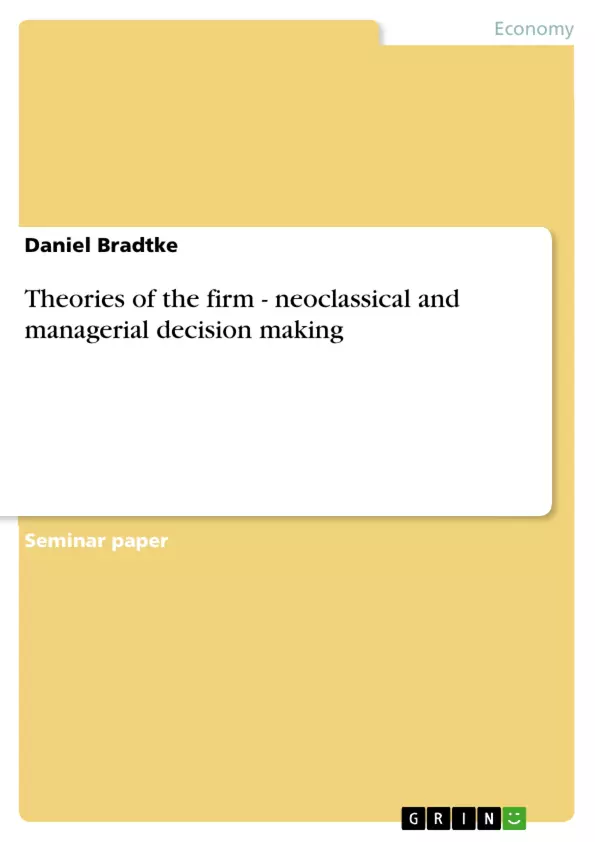For a long time, economists have seen the firm as a black box, arguing that firms maximise profits. Without following this ultimate goal, economists say that organisations would not survive in competitive markets (Makamason, 2004). In order not to be replaced, managers would have to comply with the objective of profit (value) maximisation. Hart (1989) says that this "neoclassical" view of the firm has been challenged considerably over the last three decades due to theoretical developments and increasing empirical evidence that managers may not pursue shareholder interests.
The key assumptions of the traditional theory of the firm are maximisation of profit and decision making under conditions of perfect knowledge (Nellis and Parker, 2002). By ignoring many other involved complexities, this neoclassical approach has the ability to predict corporate behaviour in perfectly competitive and monopoly market structures. The maximisation assumption portrays the firm as a “single market, single product asset of the owner who adapts a production plan in response to changing market conditions” (Makamason, 2004). Its prolonged survival is due to the useful analysis of how a firm's production choices respond to exogenous change in the environment. Such an example being an increase in wages or a sales tax (Loasby, 1989).
Table of Contents
- Abandoning traditional key assumptions
- Growth in oligopoly
- The growth of managerial capitalism
- Difficulties surrounding profit maximisation
- The organisational complexity of firms
- Merits and insights of the new theories of corporate behaviour
- Principal-agent theory
- Managerial theories
- Sales revenue maximisation
- Managerial utility maximisation
- Corporate growth maximisation
Objectives and Key Themes
This text challenges the traditional neoclassical theory of the firm, which assumes profit maximisation as the primary objective. It explores how modern economic developments, particularly the rise of oligopolies and managerial capitalism, have made the traditional assumptions inadequate in explaining corporate behaviour. The text examines alternative theories of corporate behaviour, including principal-agent theory and managerial theories, providing insights into the complex motivations and decision-making processes of firms in a dynamic environment.
- Challenges to the traditional neoclassical theory of the firm
- The emergence and influence of oligopolies
- The role of managerial capitalism in shaping corporate behaviour
- Alternative theories of corporate behaviour
- The impact of incomplete information on decision-making
Chapter Summaries
The first chapter examines the reasons for abandoning the traditional key assumptions of profit maximisation and perfect knowledge. It argues that the growth of oligopoly and managerial capitalism, as well as the complexity of firms and incomplete information, necessitate alternative theories of corporate behaviour. The chapter explores the difficulties in applying the traditional theory to situations of interdependence and strategic interaction among firms in oligopolistic markets.
The second chapter delves into the merits and insights of the new theories of corporate behaviour. It focuses on principal-agent theory, which examines the relationship between owners (principals) and managers (agents) and its implications for decision-making. Furthermore, the chapter explores various managerial theories, including sales revenue maximisation, managerial utility maximisation, and corporate growth maximisation, offering alternative perspectives on corporate goals and motivations.
Keywords
The text focuses on key concepts such as oligopoly, managerial capitalism, principal-agent theory, managerial theories, sales revenue maximisation, managerial utility maximisation, corporate growth maximisation, incomplete information, and decision-making. These keywords highlight the primary themes and arguments of the work, providing a framework for understanding the complexities of corporate behaviour in modern economic contexts.
Frequently Asked Questions
What is the main criticism of the neoclassical theory of the firm?
The main criticism is that its assumptions of profit maximization and perfect knowledge are too simplistic and fail to account for modern complexities like managerial capitalism and oligopolies.
What is the Principal-Agent theory?
It is a theory that examines the relationship and potential conflict of interest between firm owners (principals) and managers (agents) who may not always act in the owners' best interests.
What are alternative managerial objectives besides profit maximization?
Alternative objectives include sales revenue maximization, managerial utility maximization, and corporate growth maximization.
How does an oligopoly affect corporate behavior?
In oligopolies, firms are interdependent, meaning their decisions are influenced by the strategic interactions and expected reactions of their competitors.
Why is the "black box" view of the firm being abandoned?
Economists are moving away from this view because empirical evidence shows that internal organizational complexity and incomplete information significantly impact how decisions are actually made.
- Arbeit zitieren
- Daniel Bradtke (Autor:in), 2004, Theories of the firm - neoclassical and managerial decision making , München, GRIN Verlag, https://www.hausarbeiten.de/document/60629


